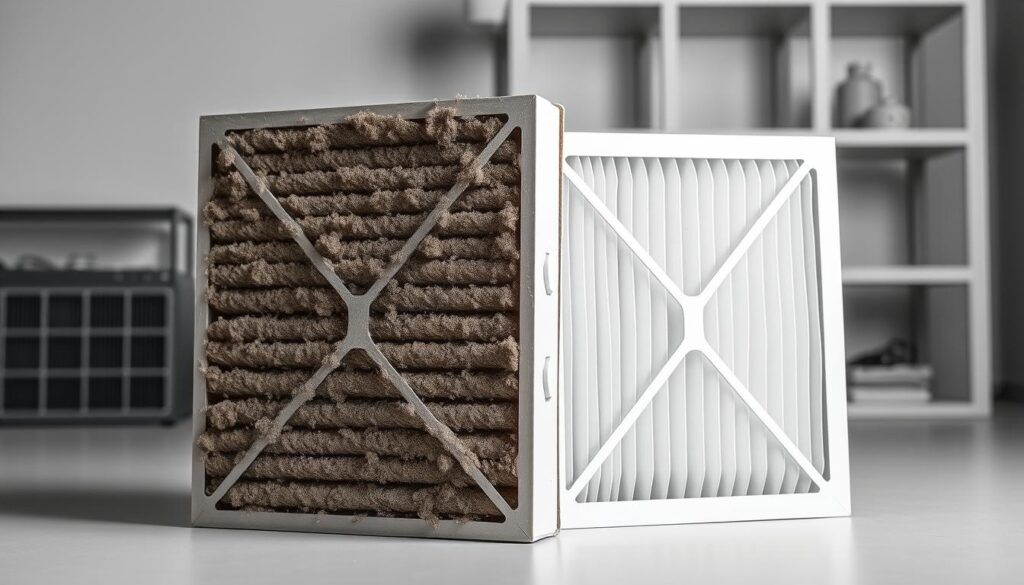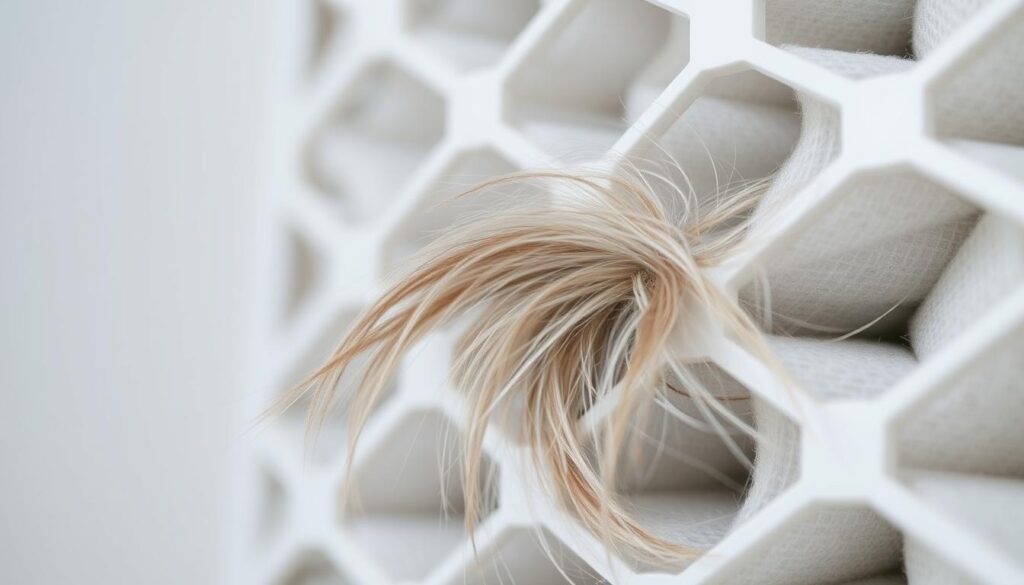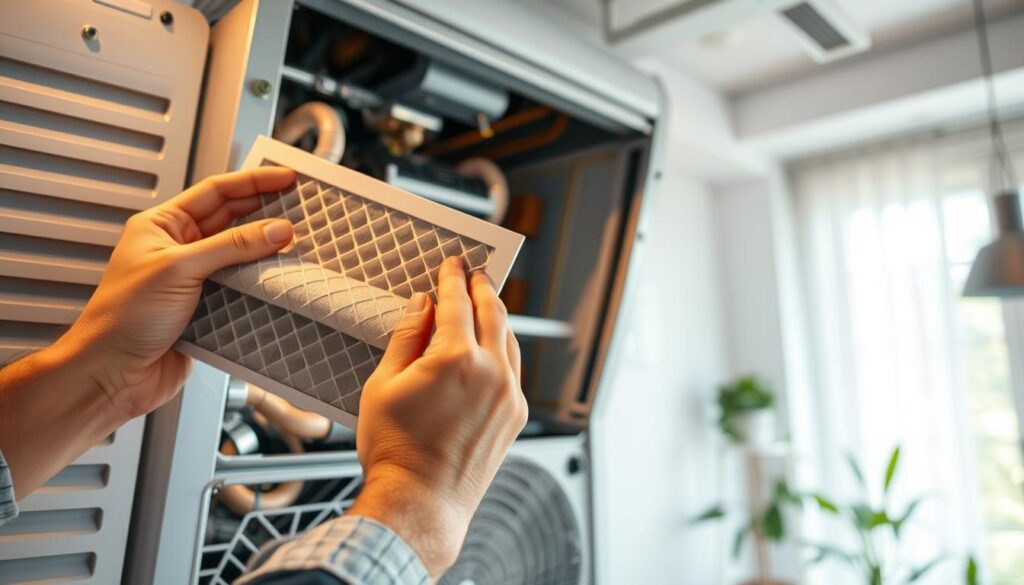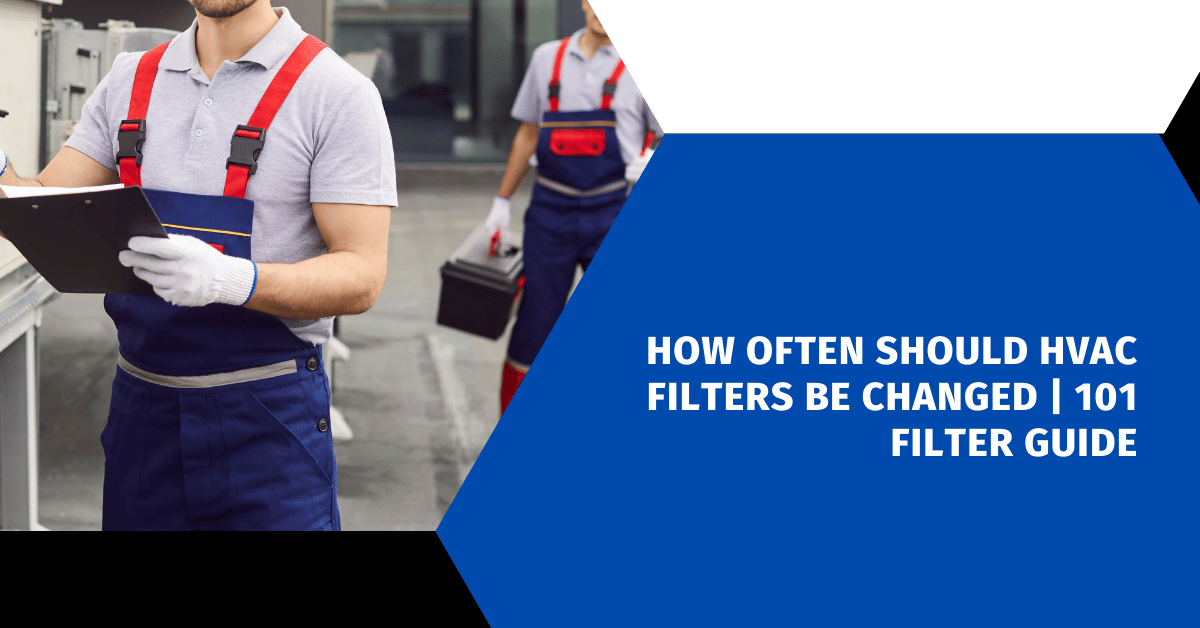Affiliate Disclosure
HVAC Guide Guys is a participant in the Amazon Services LLC Associates Program, an affiliate advertising program designed to provide a means for sites to earn advertising fees by advertising and linking to Amazon.
How Often Should HVAC Filters Be Changed? Are you unknowingly compromising your home’s air quality and HVAC system performance? The secret to maintaining a healthy living environment lies in understanding how often HVAC filters should be changed. Your home’s comfort and efficiency depend on this critical maintenance task.

HVAC filter replacement frequency is more than just a routine chore. It’s a key step in protecting your heating and cooling system. It also improves indoor air quality and reduces energy costs. Different factors influence how often you should swap out your filters, from household conditions to filter types.
This guide will walk you through everything you need to know about HVAC filter maintenance. Whether you’re a new homeowner or looking to optimize your current system, you’ll discover practical insights. These insights will help keep your home’s air clean and your HVAC running smoothly.
Key Takeaways
- Regular filter changes are essential for optimal HVAC performance
- Filter replacement frequency varies based on household conditions
- Different filter types require different maintenance schedules
- Clean filters can significantly improve indoor air quality
- Proper maintenance helps reduce energy costs and extend system life
Table of Contents
Understanding HVAC Filter Basics and Their Importance
Your HVAC system does more than just heat and cool your home. It’s a complex system that needs clean, efficient filters to work well. Keeping your filters clean is key to a healthy home and a smooth-running system.
HVAC filters are vital for your home’s air quality and system health. They catch harmful particles that could harm your equipment or health.
What Are HVAC Filters?
HVAC filters are barriers that catch:
- Dust and dirt particles
- Pollen and allergens
- Pet dander
- Microscopic contaminants
Why Regular Filter Maintenance Matters
Cleaning your HVAC filters is not just a good idea—it’s necessary. Dirty filters can make your system less efficient and even break down.
| Maintenance Frequency | System Efficiency Impact |
|---|---|
| Monthly Cleaning | Up to 15% improved performance |
| Quarterly Replacement | Consistent airflow and quality |
Impact on System Performance
Clean filters help your HVAC system run at its best. They reduce wear on parts, lower energy use, and keep temperatures steady. Regular maintenance can save you money on repairs.
Types of HVAC Filters and Their Lifespans
Knowing about different HVAC filters is key to keeping your air clean and your system running well. Each filter has its own strengths that affect how well your system works and when you need to change it.
Fiberglass Filters: Budget-Friendly Option
Fiberglass filters are the cheapest option for homeowners. They are thin and disposable, giving basic protection to your HVAC system. Here are some important points:
- Lowest cost filter option
- Minimal filtration capabilities
- Recommended replacement every 30 days
- Best for low-traffic homes with minimal air quality concerns
Pleated Filters: Enhanced Performance
Pleated filters offer better filtration than fiberglass. They have more surface area, catching more particles. Consider these features:
- Higher efficiency in trapping dust and allergens
- Extended lifespan up to 90 days
- Available in various MERV ratings
- Ideal for homes with pets or allergy sufferers
Washable Filters: Eco-Friendly Alternative
Washable filters are a green choice for those who want to save money and the environment. They need more care but can save money in the long run:
- Can be cleaned and reused multiple times
- Higher upfront cost
- Require careful cleaning to maintain effectiveness
- Best for homes with consistent air quality
Choosing the right HVAC filter depends on your home’s needs, budget, and air quality. Regular upkeep and timely replacements are essential for a well-functioning system.
Explore Our HVAC Shop
Looking for top-rated HVAC tools, parts, and accessories? Visit our shop and find the perfect solution for your needs.
Visit the ShopHow Often Should HVAC Filters Be Changed
Knowing when to change your HVAC filters can save you money and keep your system working well. The time needed for a change depends on several important factors.
Standard HVAC filters usually need to be replaced every 30 to 90 days. The exact time depends on how well your system works and the air quality inside your home.
- Basic disposable filters: Replace every 30-60 days
- High-efficiency filters: Replace every 6-12 months
- Homes with pets or allergy sufferers: Consider monthly replacements
The cost of replacing an HVAC filter is between $10 and $50. This is a small price compared to fixing a broken system. Regular care helps avoid costly repairs and keeps your system running efficiently.
It’s important to check your filter often. If it looks dirty, dark, or full of debris, it’s time for a new one. Don’t wait until your system starts to malfunction – regular maintenance is the best way to protect it.
“Prevention is always cheaper than repair when it comes to HVAC maintenance.”
Things like the size of your home, how many people live there, pets, and local air quality can make filters wear out faster. Keep an eye on your home’s specific needs to find the best replacement schedule.
Factors Affecting Filter Replacement Frequency
Your HVAC filter’s lifespan is influenced by many factors. These elements affect your home’s air purification schedule. Understanding them helps keep your indoor air quality and system performance at their best.
Several variables determine how often you need to replace your HVAC filters. Knowing these factors ensures your system works well and keeps the air clean.
Home Size and System Usage
Bigger homes need more frequent filter changes. This is because they have more air moving around. Your HVAC system works harder in larger spaces, which makes filters wear out faster.
- Larger homes mean more air movement
- Constant system use strains filters more
- Higher usage means filters need to be replaced more often
Indoor Air Quality Considerations
Indoor pollutants greatly affect your hvac air purification schedule. Things like dust, pet dander, and outside air conditions are key to keeping filters clean.
- Pets make filters dirtier faster
- Building or renovating introduces more particles
- Smoking indoors makes filters dirty quicker
Seasonal Impact
Seasonal changes also play a big role in how often you need to replace filters. Pollen, humidity, and temperature changes all pose challenges for keeping the air clean.
- Spring: High pollen levels mean more frequent changes
- Summer: Higher humidity traps more particles
- Winter: Closed environments concentrate indoor pollutants
Regular filter maintenance is your first line of defense in maintaining healthy indoor air quality.
Explore Our HVAC Shop
Looking for top-rated HVAC tools, parts, and accessories? Visit our shop and find the perfect solution for your needs.
Visit the ShopImpact of Household Occupants on Filter Maintenance
The number and lifestyle of people in your home affect how often HVAC filters need to be changed. Homes with more people usually need filters replaced more often. This is because there are more air particles and daily activities.
Different household dynamics affect how often you need to replace HVAC filters. For example, families with young children should watch their filter maintenance closely. Kids are more sensitive to air quality and make more dust and debris through play and daily activities.
- Larger families generate more indoor pollutants
- Households with children may need more frequent filter changes
- Active lifestyles increase filter contamination
Your home’s specific characteristics determine how often HVAC filters should be changed. Consider these key factors when setting up a filter replacement routine:
| Household Type | Recommended Filter Change Frequency |
|---|---|
| Single Person | Every 6-12 months |
| Family with Children | Every 3-6 months |
| Large Family or Active Household | Every 2-3 months |
High-traffic homes with many occupants will gather more dust, skin cells, and airborne particles. Regular filter maintenance is key to keeping indoor air quality good and protecting your HVAC system’s efficiency.
Proactive filter replacement is key to maintaining a healthy home environment for all occupants.
Pet Ownership and Filter Replacement Schedule
Pet owners face unique challenges with hvac air filter maintenance. Pets shed hair, dander, and dirt that can clog filters. This means you need to clean your hvac system filters more often.

It’s important to know how pets affect your home’s air quality. Different pet situations need different maintenance plans.
Single Pet Households
In homes with one pet, you should check filters more often. Pet owners should:
- Inspect filters monthly
- Replace filters every 60-90 days
- Use higher-efficiency filters with MERV ratings between 8-13
Multiple Pet Considerations
Homes with multiple pets need even more filter care. The more pets, the more often you’ll need to replace filters.
| Number of Pets | Recommended Filter Replacement |
|---|---|
| 1-2 Pets | Every 2-3 months |
| 3-4 Pets | Every 1-2 months |
| 5+ Pets | Every 30-45 days |
Pet Hair and Dander Management
To reduce filter strain, try these tips:
- Brush pets regularly to reduce loose hair
- Use air purifiers to capture additional pet dander
- Vacuum frequently with HEPA-filtered vacuums
- Consider washable filters for easier maintenance
Proactive hvac air filter maintenance helps manage pet-related air quality issues. It keeps your HVAC system efficient.
Signs Your HVAC Filter Needs Immediate Replacement
Keeping up with your hvac filter change schedule is key for good air quality and system performance. Knowing when to replace your filter can prevent expensive repairs and keep your system running smoothly.
Start by checking your filter with a light. If light has trouble getting through, it means your filter is full of dust and dirt.
- Visible dirt accumulation on the filter surface
- Reduced airflow from heating and cooling vents
- Unexplained increase in energy bills
- More frequent system cycling
- Unusual dust buildup around air registers
Watch out for these signs. A dirty filter makes your HVAC system work too hard, leading to damage. If you notice less air coming out of vents, it’s a sign your filter is blocked.
If you have pets, smoke, or allergies, you might need to change filters more often. Regular checks every 30-90 days can help avoid problems and keep your home air clean.
Explore Our HVAC Shop
Looking for top-rated HVAC tools, parts, and accessories? Visit our shop and find the perfect solution for your needs.
Visit the ShopFilter Maintenance for Allergy and Asthma Sufferers

Keeping indoor air clean is key for those with allergies and asthma. Your HVAC system is vital in keeping air healthy. It does this through good hvac air quality maintenance and the right filter choice.
Choosing the Right MERV Rating
For homes with allergy concerns, knowing about MERV ratings is important. The Minimum Efficiency Reporting Value (MERV) shows how well a filter catches tiny particles:
- MERV 8-10: Good for basic home needs
- MERV 11-13: Better for those with allergies
- MERV 14-16: Best for severe allergy cases
Recommended Replacement Intervals
If you or your family has breathing issues, change your filters more often. Here are some guidelines:
- Mild allergies: Change filters every 60-90 days
- Severe allergies or asthma: Change every 30-45 days
- Pets or high pollution: Consider changing every month
Pro tip: Always talk to an HVAC expert. They can help tailor your filter plan to your health and home needs.
Cost Considerations and Energy Efficiency
Knowing the cost of HVAC filter maintenance is key to smart home decisions. The cost of replacing filters might seem high, but it can save you money over time.
The Department of Energy says a clean filter can boost system efficiency by 5-15%. This means lower energy bills. The lifespan of your filter affects your system’s performance and energy use.
- Regular filter changes prevent costly system repairs
- Efficient filters reduce energy consumption
- Proper maintenance extends HVAC system longevity
Here’s a cost comparison for different filters:
| Filter Type | Average Cost | Recommended Replacement Frequency |
|---|---|---|
| Fiberglass | $1-$3 | Every 30 days |
| Pleated | $5-$15 | Every 90 days |
| High-Efficiency | $15-$40 | Every 6-12 months |
To cut down on filter costs, think about subscription services. They send filters to your door. This keeps your schedule on track and might offer discounts.
Investing in quality filters is investing in your home’s comfort and efficiency.
Explore Our HVAC Shop
Looking for top-rated HVAC tools, parts, and accessories? Visit our shop and find the perfect solution for your needs.
Visit the ShopProfessional Maintenance vs DIY Filter Changes
Keeping your HVAC system’s filter clean is vital for its performance and air quality. You can choose between getting professional help or doing it yourself. This decision depends on several factors.
Professional maintenance offers more than just changing filters. It includes detailed system checks and expert advice.
Advantages of Professional HVAC Filter Service
- Comprehensive system diagnostic checks
- Expert recommendations for filter selection
- Early detection of system issues
- Thorough cleaning and performance optimization
DIY Maintenance Tips
If you’re handy with basic tasks, changing your HVAC filter can be easy. Here are some tips to help you do it right:
- Determine the correct filter size for your system
- Turn off your HVAC system before replacing the filter
- Remove the old filter carefully
- Check the airflow direction arrow on the new filter
- Insert the new filter with the correct orientation
DIY maintenance can be cost-effective. But, professional service offers the advantage of expert evaluation and problem prevention.
Remember: Regular filter maintenance is key to maintaining system efficiency and indoor air quality.
Whether to go for professional service or DIY depends on your comfort, skills, and system complexity.
Conclusion
Keeping up with HVAC air filter maintenance is more than a chore. It’s an investment in your home’s comfort and efficiency. Knowing when to replace your filters can greatly improve your system’s performance and air quality.
Your efforts in filter care protect your HVAC system and your home. By considering factors like household size, pets, and air quality, you can tailor your maintenance. This keeps your system efficient and your air clean.
Regular filter maintenance is worth the effort. It can save you money on repairs and energy bills. Plus, it makes your home a healthier place for your family.
Start by checking your current filter maintenance routine. Your HVAC system and health will appreciate the care.

